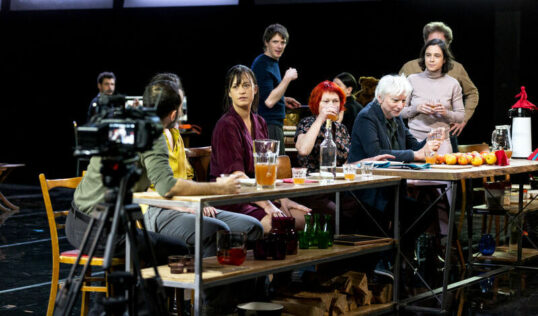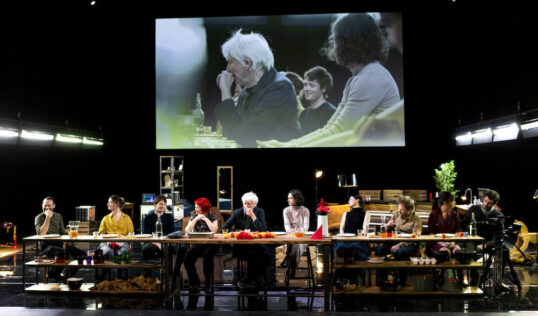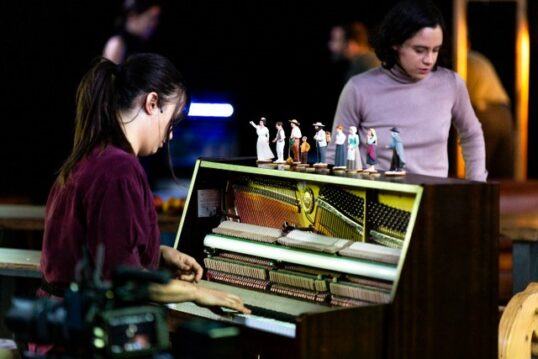Dusk (EIF)
★★★☆☆ Dry
Lyceum Theatre (EIF): Sat 5 – Tues 8 Aug 2023
Review by Hugh Simpson
Dusk from Comédie de Génève in the International Festival at the Lyceum is a thought-provoking and politically charged work that does not always engage as it might.
While not a straightforward adaptation, Brazilian director Christiane Jatahy’s play takes as its inspiration Lars von Trier’s 2003 movie Dogville. This – depending on your point of view – is either something approaching a masterpiece in its analysis of the nature of evil, or an overlong exercise in misanthropy.
Jatahy’s version features a group of actors seeking to eliminate what they see as the problems of the film and give it a ‘better’ ending. In order to demonstrate the nature of acceptance, spokesperson/philosopher Tom encourages them to involve Graça, who has fled persecution in Brazil.
Just as the film uses self-consciously theatrical, almost Brechtian techniques, the play merges cinema and theatre, not least through the use of a huge screen throughout. Such screens, where the onstage action is projected, became a big thing just before the pandemic, but can have real disadvantages.
Even when the technology works seamlessly – as it does here, with clever use made of moments when what is on screen is pre-recorded rather than what is happening on stage – such an approach does not always bear fruit. Seeking to combine the best of both of the worlds of stage and film, it often seems to exacerbate any problems in both media.
troubles magnified
Here any troubles are magnified by the fact of the production being performed largely in French; the supertitles are at the top of the screen. This may not be a problem in the stalls, but from the circle the eye is constantly drawn away from the live performance.
This makes it difficult to become fully immersed in the onstage action. This surely is partly the point of a production that asks us to question the nature of truth. Such a grand tradition of audience alienation has often sought to question the mechanics of artistic representation. However, to draw attention to the unnecessary nature of a production’s very existence is not always a good idea.
The questions that come to mind are not necessarily those about the nature of tolerance or about how easy it is for fascism to take hold in Brazil or elsewhere – the subject of a coda that (praiseworthy and urgent though it undoubtedly is) verges on the didactic and fails to gel with what has gone before.
Earlier, we are more likely to ponder why it is thought essential to adapt yet another movie for the stage in the first place. This is particularly relevant when it is a film about which the adapter, like many, seems to have decidedly mixed feelings. And why should the theatrical adaptation of a film take place largely on screen?
There can be no denying the efforts of the cast or director; there is a strong ensemble feeling, with Julia Bernat (Graça), Matthieu Sampeur and Philippe Duclos particularly impressing. The technical side of the production is first-rate, with director of photography Paulo Camacho, video designers Julio Parente and Charlélie Chauvel and Thomas Walgrave (set and lighting design) particularly noteworthy.
In the end, however, this dialogue between theatre and film comes across as dry rather than arresting. When the subject matter is well deserving of the content warnings on this occasion, this can leave a decidedly uneasy feeling. This is not helped by being an hour and three-quarters long without an interval, something of which one becomes all too aware in a production that ultimately fails to grip.
Running time: One hour and 45 minutes (no interval)
Part of the Edinburgh International Festival
Lyceum Theatre, Grindlay St, EH3 9AX
Saturday 5 – Tuesday 8 August 2023
Daily at 7.30 pm; Matinee Mon 2.30 pm
Tickets and details: Book here.
ENDS





















